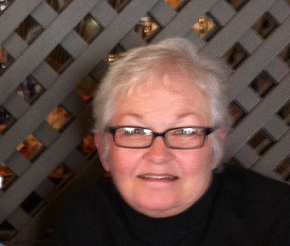Faces of COPD: Pat Billeb says 'Exercise Makes a Difference for Body and Mind'
Posted on November 07, 2017 |
Pat is a former smoker with COPD. She shares the story of her diagnosis, how she lives with COPD today and provides sound advice for people affected with this disease.
Pat’s Diagnosis
Pat, age 59, was diagnosed with COPD almost seven years ago. She smoked for more than 50 years yet when her primary care physician encouraged her to quit she “pooh poohed” the idea. “I coughed my head off. Then one day everything came to a crashing halt. I couldn’t make it more than four feet and was exhausted.”
 The week that Pat was diagnosed she was looking at wedding venues with her daughter. She recalls not being able “to take the stairs. That next Tuesday I had a doctor’s appointment thinking I had the flu. I was immediately admitted for respiratory failure. My oxygen was 74 and my doctor couldn’t hear anything in my lungs. His startled expression told me it was not good. From that point on, I never pooh poohed anything my primary said.”
The week that Pat was diagnosed she was looking at wedding venues with her daughter. She recalls not being able “to take the stairs. That next Tuesday I had a doctor’s appointment thinking I had the flu. I was immediately admitted for respiratory failure. My oxygen was 74 and my doctor couldn’t hear anything in my lungs. His startled expression told me it was not good. From that point on, I never pooh poohed anything my primary said.”
With respiratory failure, Pat spent three days in the hospital. “I did lots of breathing therapy. I was stabilized and put on oxygen 24/7. I was scared. My daughter was getting married in eight months and I wanted to be around for that.”
Pat started searching for information that would “send me on the right track to live with COPD. I knew it wasn’t curable but it might be controllable.” Pulmonary rehab helped Pat learn to live with COPD. “It was a fantastic experience. Those of us in rehab started meeting for lunch dates. It was great to talk with others who were in the same boat, just like with the friends I’d made online. We’d talk about what works for us, including medications. Exercise alone makes a difference in your body and mind.”
She also participated in the PELICAN study, a peer-led oxygen information line for adults with COPD who use oxygen 24/7, with the goal of improving the health and wellbeing of patients and caregivers. “Even though I knew a lot, I learned more through the person I was paired up with.”
One of Pat’s support group friends told her about the COPD Foundation (COPDF). After attending a COPDF conference, Pat was “immediately smitten. Someone suggested I become a State Captain. I was eager to get involved to help others as I have been helped and I became the COPD State Captain for Wisconsin.”
Life Before & After COPD
Pat was “much more active if you go back two or three years. I would do things with the grandkids. Nothing slowed me down. Thinking back, I just slowed way down. I’m not as mobile as I used to be and there’s always the oxygen I have to take with me.”
Pat follows her primary’s advice as well as the advice of her pulmonologist and pulmonary rehab team. “From that point on, I never pooh poohed anything! I listened and learned because I knew if I didn’t, I probably wouldn’t be around long.”
Pat’s family came together and realized that changes would have to be made. “I was sent home from the hospital not having been shown how to use an inhaler. They put everything into action. No one really knew what was wrong. They were there for me and learned along with me.”
Pat also wasn’t as much of a “germ freak as I am now. It matters a lot to me. My family is aware a cold could be devastating and they are committed to keeping the germs out.”
Some Words of Wisdom
Based on her experience, Pat would like to offer others with COPD and their caregivers some advice:
- If you’ve been newly diagnosed, be patient and honest with yourself. Find as much information as you can to keep you healthy.
- If you’re in pulmonary rehab, stick with the program once you complete the program. Not staying with an exercise program is the most detrimental thing that a person with COPD can do.
- Join a support group—you’ll have people in the same boat that want to help you. Don’t shy away as it really helps to share.
- Some individuals with COPD don’t take their medications seriously enough. Stretching doses can do you harm.
- If you’re a family member, friend or caregiver, be patient and learn with the person who’s been diagnosed with COPD. Likewise, if you’re the person with COPD, take time to explain your medications, the liters of O2, the portable concentrator’s function and parts, etc. Communication is key.
- Talk to younger groups and encourage them not to smoke.
- If you know someone who smokes, “affectionately” encourage them to quit.
- And, finally, do what you can to make it easier for those who have COPD to live with it.
In recognition of National COPD Awareness Month, the COPD Foundation is featuring a new "Faces of COPD" profile every day in November. The "A New Day, A New Face of COPD" blog series will highlight the stories of those who have been touched by COPD in any capacity. Tell your story by e-mailing us at info@copdfoundation.org or commenting below.